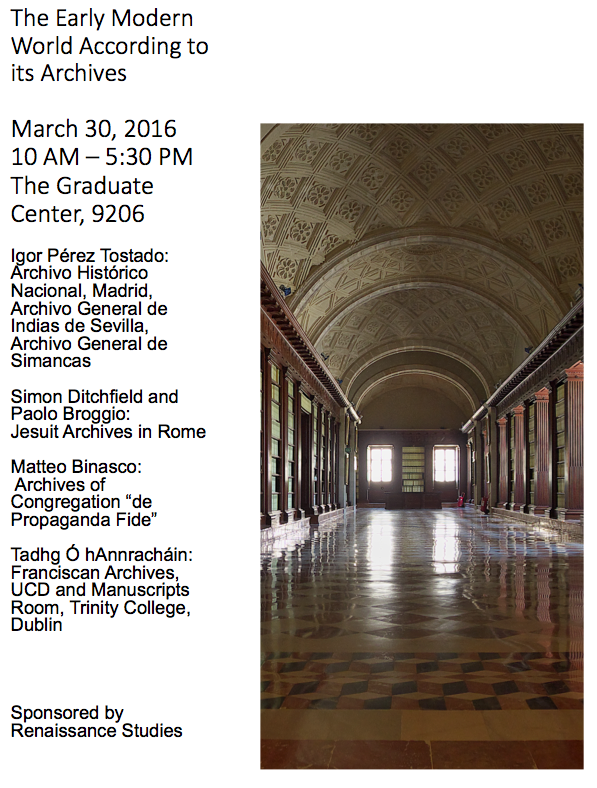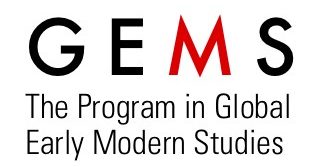The Early Modern World According to Its Archives: Abstracts
The Early Modern World According to Its Archives:
Research Case Studies in European Collections
The Graduate Center, CUNY, Room 9206
10 AM – 5:30 PM, March 30, 2016
Abstracts
Archivo Histórico Nacional, Madrid, Archivo General de Indias de Sevilla, and Archivo General de Simancas
Igor Pérez Tostado (Universidad Pablo de Olavide, Spain): “The Slow Heartbeat of Spain: the Early Modern World According to its Archives”
Between the late fifteenth and the early sixteenth century, the crowns of Castile, Aragon, and Navarre developed a process of dynastic incorporation and military conquest that created a political, diplomatic, and military union around a single dynasty. This process included the Mediterranean possessions of the crown of Aragon, the Atlantic conquests of Castile, the inheritance of the house of Bourgogne that dominated the Low Countries, and the Habsburgs, holders of the imperial title and rulers of the central Europe. In the 1580s, Portugal and its American, African, and Asian dominions joined this conglomerate.
In order to keep pace with the new tasks and responsibilities acquired by the monarchs and the vastness and fragmentation of their territories, an enormous fiscal, judiciary, diplomatic and military administration of unprecedented complexity, and world reach developed. The alleged slowness of the administration is explained not only by its size and complexity, but also by the difficulties of the navigation in the immensities of the Atlantic, Indian, and Pacific Oceans. Information from all the corners of the planet was necessarily waited for and taken into account in order to govern the first planetary economic and political unit in history. This is why, as Braudel put it, “the heart of Spain beats more slowly than others.”
Document keeping shifted too, from the preservation of the papers of the monarch, to the records of the kingdoms in the castle of Simancas, a purpose built archival institution of the sixteenth century. At the end of the early modern period, as its use passed from administrative to historical, part of its holdings were moved first to Seville and then Madrid. For historians of early modern Europe, Africa, America, and Asia, their combined use offers invaluable material for the understanding of the polycentric decision-making nature of the worldwide Spanish Monarchy and the hundreds of questions, from social to military, and from economic to cultural, that were addressed on a daily basis.
Franciscan Archives, University College Dublin, and Manuscripts Room, Trinity College, Dublin
Tadhg Ó hAnnracháin (University College, Dublin): “Researching the mid-seventeenth-century crisis in Dublin: the Franciscan Archives in University College Dublin and the Aphorismical Discovery of Treasonable Faction in Trinity College”
This seminar will focus on two principal themes. The first will be an exploration of a body of material in the Archives of University College Dublin that is of significant importance for the history of the 1640s in Ireland. St Isidore’s Franciscan College in Rome was founded by Luke Wadding in 1625 and for over two centuries it was a major center of Irish scholarship and ecclesiastical activity in the city. In 1872, large numbers of the college’s documents were transferred to Dublin, first to Marchant’s Quay, and then to the Franciscan house Dun Mhuire in Killiney until 2000, when they were brought to the Archive of University College Dublin where they currently reside. The seminar will concentrate on the value of this collection for the insight which it offers both into ecclesiastical affairs in the second quarter of the seventeenth century in Ireland, and the type of material it affords relating to Luke Wadding’s role as accredited agent to the Confederate Catholics of Ireland. The second part of the seminar will consider a highly unusual manuscript currently housed in Trinity College Dublin, The Aphorismical Discovery of Treasonable Faction with some observations on the utility of a narrative history of this type as a historical source for the period.
The Jesuit Archives in Rome I:
Simon Ditchfield (Professor of History, University of York): “ ‘The Paper Religious Order’: Archivium Romanum Societas Iesu (ARSI)”
ARSI contains the archives of the general government of the Society of Jesus from its foundation in 1540 down to the twentieth century. For the purposes of this workshop, focus will be on the records of the “Old Society” (1540-1773). If that micro-manager par excellence, Philip II of Spain, is known as ’the paper king’, then the Society of Jesus might be described as “the paper religious order” since it was held together by a dense network of correspondence between Rome and its missionaries. Most of those addressed to the Father General in Rome– the famous ‘annual letters’ – are preserved here; as are, too, the famous series of letters from Jesuits seeking to go to the Indies (the litterae indipetae). Also of interest are documents relating to the history of the order, its governance, and to its famous members. The focus of this session, however, will principally be on how one can track the career of Jesuits through the archival record. I will be taking as my case study the career of the polymath and historian of the Society Daniello Bartoli (1608-85). Passing reference will also be made to the archive of the Roman College (now in the Pontifical Gregorian University) and the fondo gesuitico in Rome’s National Library.
The Jesuit Archives in Rome II:
Paolo Broggio, Roma Tre University: “Roman Archives and Catholic Missions: Evangelization, Globalization, Centralization”
In the sixteenth century, Rome became the main center for gathering information concerning worldwide evangelization, and the lands in which the missionaries were engaged. They gathered information concerning natural history, scientific observations, the languages, customs and traditions of the indigenous peoples. The Roman Archives, therefore, represent an extraordinary documentary repository for so-called “ethno-history.” Catholic missionaries had the capacity (rare for that age) to deeply observe and describe what they were called to transform.
The Society of Jesus was one of main missionary orders, and undoubtedly the most important with respect to the quantity and quality of information that Jesuit missionaries sent to Rome from all over the world in order to inform their Father General. The internal ratio scribendi obliged single missionaries, Colleges’ Superiors, and Father Provincials to observe precise rules for correspondence. The purpose of my talk will be to present ARSI as an archive the history of missions. Litterae annuae, mission reports, private letters, but also proceedings of the Provincial Congregations, histories of the colleges, and catalogues of subjects: all these different sources contain precious information concerning missions, and each of them offers a different perspective on the phenomenon of induced cultural change on a global scale in the early modern times.
Archives of the Sacred Congregation “de Propaganda Fide”
Matteo Binasco (Postdoctoral Fellow, Rome Global Gateway, University of Notre Dame): “Organization, Holdings and Possibilities for Research on Ireland and the Caribbean”
These archives contain all the material pertaining to the activity of the Sacred Congregation “de Propaganda Fide” from its foundation in 1622 to 1939. The focus will be on the old section that contains the records of Propaganda from 1622 to 1892. Given that Propaganda was founded with the key aim to supervise the worldwide Catholic missionary activity, the archives of the Roman ministry provide a “global” outlook. Indeed Propaganda received and collected letters, petitions, and reports which were written by the missionaries who were active in the most remote corners of the world, from Asia to Africa, and from North America to Australia. This session will be divided in three parts: the first will seek to illustrate what Propaganda was and how it worked; the second will provide a brief description of its holdings and how they are currently organized; the third will focus on the importance of the material contained by Propaganda for the history of the North Atlantic world during the seventeenth century, with particular emphasis on Ireland and the Caribbean area.





[…] Igor Pérez Tostado (Universidad Pablo de Olavide, Spain): “The Slow Heartbeat of Spain: the Early Modern World According to its Archives” […]
[…] Igor Pérez Tostado (Universidad Pablo de Olavide, Spain): “The Slow Heartbeat of Spain: the Early… […]